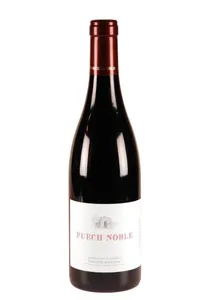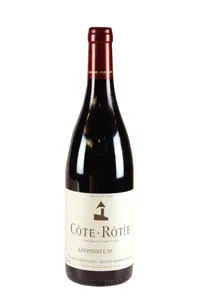Free delivery from Fr. 300 of purchase or 18 bottles, otherwise Fr. 15
Côte Rôtie Ampodium, Dom. Rostaing - 2012
- Provenance: Northern Côtes du Rhône
- Appellation: Côte-Rôtie
- Domain: René Rostaing
- Grape variety(ies): Syrah
- On-call time: 15 years
- Style of wine: Vin de grand terroir
- Alcohol degree: 13%
| Find all vintages of the domain René Rostaing |
Out of stock
Anti-crash packaging
100% secure payment
Le CAVE's warranty
Any questions about this product?
You want to print this article card?
Sheet
Technique
Viticulture
Cette Côte Rôtie est l'ancienne cuvée classique produite jusqu'à 2007, elle a juste été rebaptisée du nom du village d'Ampuis sous la période gallo-romaine. C'est un assemblage de 13 lieux-dits autres que Landonne et Côte Blonde (l’appellation Côte Rôtie en comprend plus de 50) situées sur l'ensemble du vignoble. Rendement de 30-35 hl/ha.
Oenology
Les grappes sont partiellement éraflées et la cuvaison est longue (1 mois). En outre, le domaine ne craint pas de monter assez haut en température durant les vinifications (jusqu'à 33-34 OC). L'élevage est réalisé en barriques pendant 24 mois mais sans bois neuf.
Suggestions for accompaniment
Pithivier de canard au foie gras façon Eric Briffard • Entrecôte de cerf • Perdreau ou faisan rôti.
As wine lovers know, Domaine Rostaing's wines are among the finest in Côte-Rôtie! And that's been the case for some years now... But what is generally less well known is that the estate is also based in the Languedoc region, in Langlade to be precise, just west of Nîmes.
In the late 1990s, René and his wife bought this property in the vast Coteaux du Languedoc appellation. Initially, René worked closely with Roc d'Anglade in the person of Rémy Pedreno, before following his own path in this new terroir, which is in no way comparable to Côte-Rôtie. The estate, originally called Puech Chaud, is now known as Puech Noble, to avoid confusion with Gérard Bru's Puech Haut estate.
The estate now covers 22 hectares in a single block, 12.5 of which are planted with vines. The soil here is ancient limestone garrigue, very stony, and bears a striking resemblance to the Arboussas plateau of the legendary Grange des Pères. The grapes grown here are of course Syrah, but also Mourvèdre and Grenache Noir, and Grenache Blanc and Vermentino for the whites. The vines are tended without weedkillers, using entirely mechanical methods, with an average yield of around 35 hl/hectare.
In the cellar, the grapes are harvested by hand, in the same way as at Ampuis for the reds, and partially destemmed. Fermentation and maceration last an average of 3 weeks. This is followed by...
The wines of
Domain
My Recently
viewed products
You have not viewed any products yet
Complete your
Order




